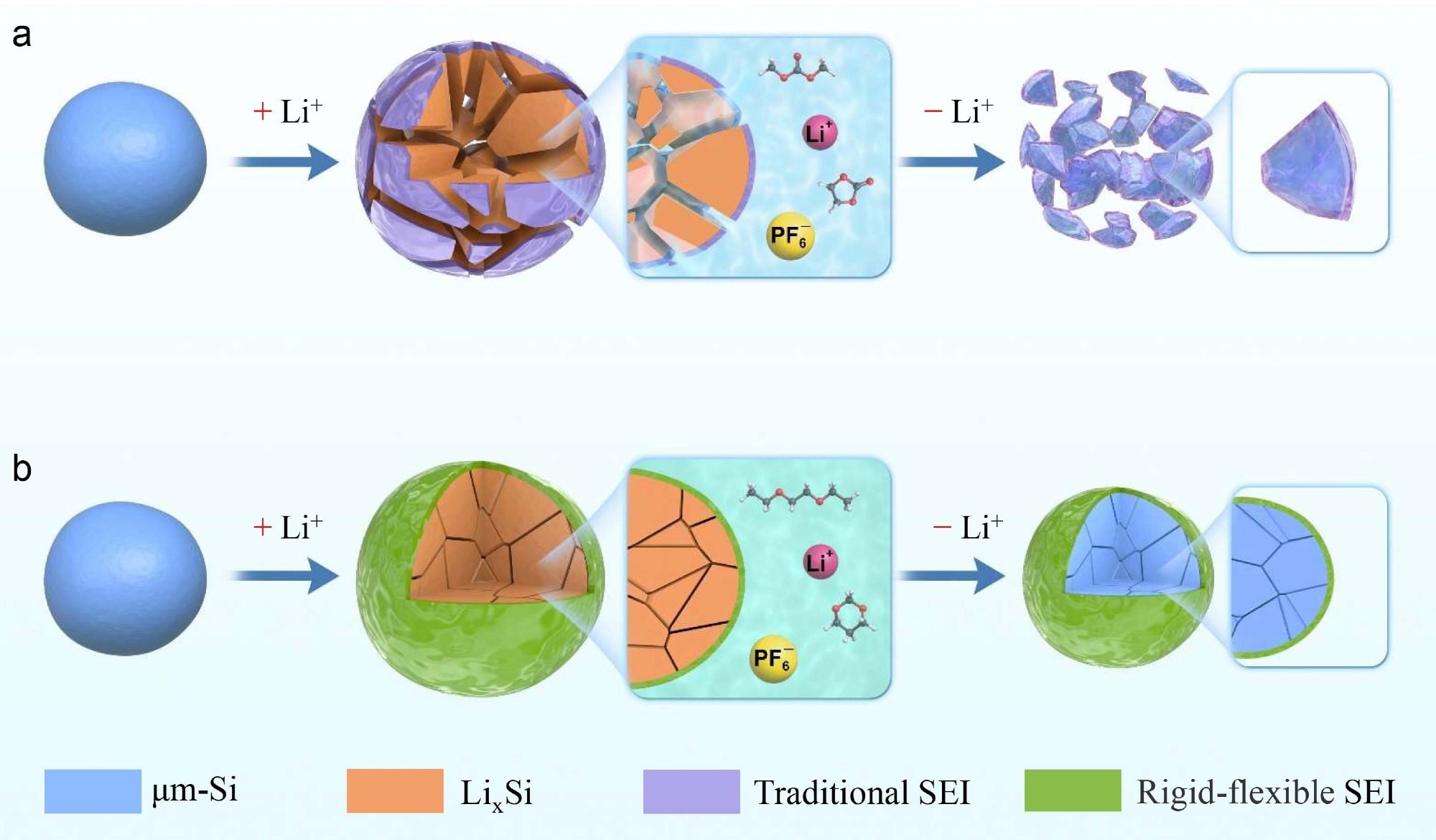Reviewed by Lexie CornerJul 17 2024
Researchers at the Qingdao Institute of Bioenergy and Bioprocess Technology (QIBEBT) of the Chinese Academy of Sciences have created low-cost micro-sized silicon anodes from recycled photovoltaic waste using a novel electrolyte design. Their groundbreaking study was published in Nature Sustainability on July 16th, 2024.
 Schematic diagram of the influence of solid-electrolyte interphase (SEI) on microsized silicon anodes during cycling. a. mixed inorganic-organic SEI in traditional electrolyte; b. rigid-flexible coupling SEI in our electrolyte. Image Credit: QIBEBT
Schematic diagram of the influence of solid-electrolyte interphase (SEI) on microsized silicon anodes during cycling. a. mixed inorganic-organic SEI in traditional electrolyte; b. rigid-flexible coupling SEI in our electrolyte. Image Credit: QIBEBT
The discovery provides a route toward low-cost, high-energy-density batteries that are more sustainable and have the potential to revolutionize energy storage systems for renewable energy and electric vehicle applications.
Although silicon anodes are more beneficial than conventional graphite anodes for significantly increasing the energy density of lithium-ion batteries, they are hampered by large volume growth during charge-discharge cycles. This expansion can lower battery performance and cause mechanical fractures.
Under the direction of Prof. Guanglei Cui, the researchers developed a workable substitute by using micro-sized silicon (μm-Si) particles derived from photovoltaic waste.
These μm-Si anodes demonstrate exceptional electrochemical durability when combined with a specially designed ether-based electrolyte. After 200 cycles, they still hold 83.13 % of their initial capacity and maintain an average coulombic efficiency of 99.94 %.
This work not only suggests a more sustainable supply source for silicon particles but also addresses the major challenges facing micro-sized silicon anode materials.
Dr. Tao Liu, Study First Author, Qingdao Institute of Bioenergy and Bioprocess Technology, Chinese Academy of Sciences
Solid-electrolyte interphase (SEI) chemistry, which the researchers created using a novel electrolyte composition of 3 M LiPF6 dissolved in a 1:3 volume ratio of 1,3-dioxane and 1,2-diethoxyethane, is the key to the anodes’ success. This formulation improves ionic conduction and minimizes side reactions while promoting the creation of a flexible yet strong dual-layer SEI that holds together fractured silicon particles.
Under severe circumstances, the NCM811||μm-Si pouch cells with the novel anode and electrolyte combination produced an outstanding energy density of 340.7 Wh kg-1 and lasted 80 cycles. This performance represents a major gain compared to traditional lithium-ion batteries, which are nearing their energy density limits.
The sustainable sourcing of silicon from discarded solar panels mitigates both the economic and environmental impacts of photovoltaic waste. Converting waste into valuable battery components significantly reduces the cost of lithium-ion batteries and increases their accessibility.
Dr. Tiantian Dong, Study Co-First Author, Qingdao Institute of Bioenergy and Bioprocess Technology, Chinese Academy of Sciences
Prof. Cui added, “By using recycled materials and advanced chemical engineering, we have demonstrated that high-performance and environmentally sustainable lithium-ion batteries are not only possible but also within reach.”
Professor Cui is hopeful that this study will result in the creation of next-generation batteries that can power anything from grid-scale energy storage to electric vehicles.
This unique method shows how creative recycling and meticulous materials science can collaborate to address the most important problems facing energy technology today.
Journal Reference:
Liu, T., et al. (2024) Recycled micro-sized silicon anode for high-voltage lithium-ion batteries. Nature Sustainability. doi:10.1038/s41893-024-01393-9